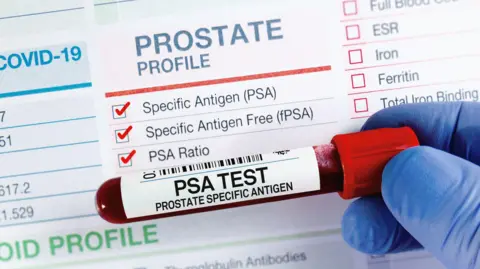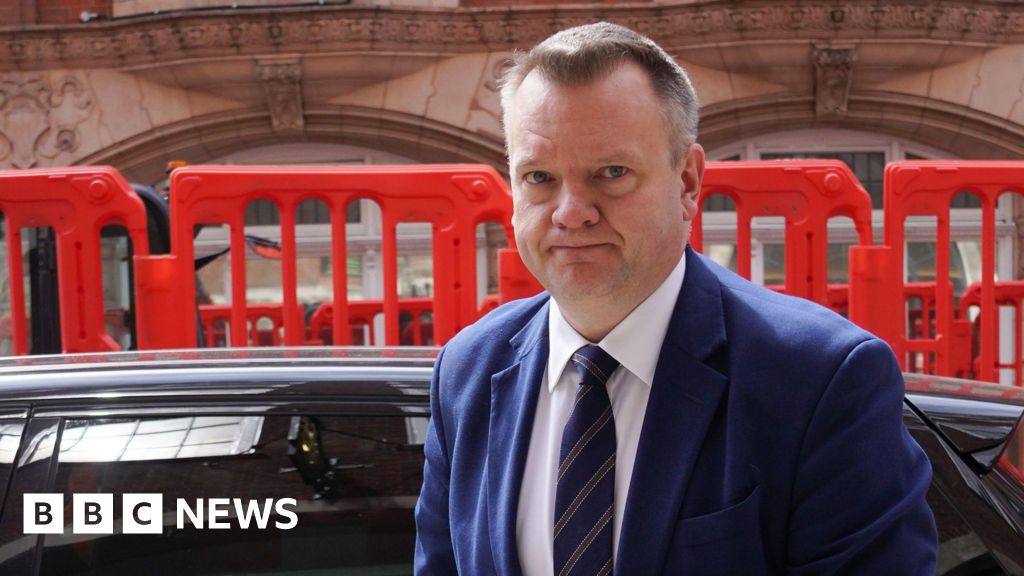ARTICLE AD BOX

 Getty Images
Getty Images
Screening men born with a high risk of developing prostate cancer, once they reach the age of 45, makes financial sense, a cancer charity says.
But Prostate Cancer Research also acknowledges more accurate tests would be needed to justify screening all men.
There is no prostate-cancer screening programme in the UK, unlike those for breast, bowel and cervical cancer.
Instead, the onus is on men to request a blood test from their GP once they are over 50.
Men dying
The debate around prostate screening revolves around an imperfect test and the trade-off between finding some men’s aggressive cancers earlier and the harms of diagnosing and treating slow-growing tumours that would never have affected a man’s health or lifespan.
The case for and against is constantly reviewed in the UK, with the most recent report from the National Screening Committee, in 2020, saying the harms were too great.
Further updates are expected this year.
Despite more men dying from prostate cancer than women from breast cancer, there is no reliable test for the disease.
The blood test men over 50 can request from their GP measures prostate-specific antigen (PSA), released by the prostate, a small gland located below the bladder involved in the production of semen.
But PSA levels can be high for a variety of reasons - including an enlarged prostate, inflammation or infection, recent vigorous exercise or sex - or remain normal despite cancer.
And there are many different kinds of prostate cancer - not all deadly.
"There are prostate cancers that are so slow-growing that they will not affect a man's lifespan," GP Dr Margaret McCartney says.
These are found in one in three men over 50.
"And then you have a small number of very aggressive prostate cancers which do move quickly and cause harm," Dr McCartney says.
Follow-up magnetic resonance imaging (MRI) scans and a tissue biopsy can help narrow down which men have cancer and need treatment - but some still end up being treated for something that would never cause a problem.
"Far more men have tests done to try to work out what kind of prostate cancer it is, than are going to benefit from it - there's the problem," Dr McCartney says.
Followed up
Clinical trials have produced conflicting results about screening.
One, in Europe, says it saves lives.
Another, in the UK, shows a more marginal benefit.
And a third, in the US, says it does not.
Prof Hashim Ahmed, chair of urology at Imperial College London, says: “We need to screen 570 men to prevent one death - that’s a lot of men to counsel.”
Screening means aggressive cancers can be treated before symptoms appear.
But trials show there are harms to testing large numbers of healthy men - and once a cancer is spotted, even a low-risk one, it needs to be followed up.
Leak urine
Many men with a low-risk cancer are simply monitored or begin “watchful waiting” - but a cancer diagnosis and the invasive tests it involves have a psychological impact.
One in 10 of these men opts for radical surgery rather than live with the anxiety of wondering whether their cancer will grow, Prof Ahmed says.
But this can leave them unable to maintain an erection - and a third spend the rest of their life needing a pad because they leak urine.
“At the age of 47-48, if we're talking about testing and diagnosing men at that age, that's two or three decades of those kinds of symptoms," Prof Ahmed told BBC Radio 4's Inside Health programme.
"So I would rather avoid finding low-risk disease.”

 Getty Images
Getty Images
Much research in the field has focused on refining the process to minimise the harms of screening.
And Prof Ahmed is running the Transform trial, starting next year, to compare the most promising technologies.
But the results could be 10 years away.
In the meantime, Prostate Cancer Research's report says, screening 45-69-year-olds at high risk - black men and those with a family history of the disease or particular gene mutations - would deliver an economic benefit, after factoring in the cost of treatment and the impact on working lives and carers.
"Finding and treating cancers early outweighs the harms of over-treatment by four times," the charity's chief executive, Oliver Kemp, says.
And another charity, Prostate Cancer UK, says the report supports its call to overhaul "dangerously outdated NHS guidance that is leading to too many men receiving a late, incurable diagnoses".
'Very difficult'
Prof Frank Chinegwundoh, a consultant urological surgeon at Barts Health NHS Trust, says: "It’s very difficult to weigh up the risks and benefits."
But he often sees men who could have been diagnosed earlier - and they can be relatively young, he says.
"We can do a lot better than we are currently doing," Prof Chinegwundoh told Inside Health.
And he says black men - who have double the risk of the disease - should consider having a PSA test at 40, particularly if they have a strong family history of the cancer.
But earlier this year, concerns were raised black men were at greater risk than other men of being harmed by a cancer diagnosis that did not need to be treated, because they have naturally higher PSA levels.
'Tough question'
While the arguments rage, what should men do today?
“It’s a really tough question,” Prof Ahmed says.
And the NHS needs to give men better information.
The trade-off between the risks and benefits of being tested is “very nuanced, very personal”, Prof Ahmed says, and what is acceptable to one man will be unacceptable to another.

 5 months ago
25
5 months ago
25








 English (US) ·
English (US) ·